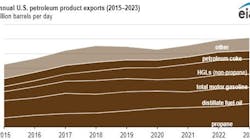Peter Howard Wertheim
OGJ Correspondent
RIO DE JANEIRO, May 17 -- Venezuela's Minister of Energy and Petroleum Rafael Ramirez announced that the country would be nationalizing its oil rigs, currently in private hands.
"Venezuelan state oil company Petroleos de Venezuela (PDVSA) owns 18 rigs that in the past were handed over to multinationals. These firms demand billions for using this equipment. Under these circumstances, we have decided to nationalize this equipment," Ramirez told newspaper El Universal. Ramirez also serves as PDVSA's chief executive officer.
Venezuela is importing oil rigs from China, and is subsequently organizing a joint venture to manufacture oil rigs in Venezuela, Ramirez added.
"The first oil rig manufactured in China to be owned by PDVSA will arrive in Venezuela next November. We have plans to purchase 13 rigs, each of which will arrive in the country on a monthly basis," Ramirez told official news agency ABN.
"Parallel to this agreement, in Venezuela we are installing an oil rig assembly plant, and in a second phase we have a goal to manufacture oil rigs in the country."
Foreign rig operators in Venezuela include Schlumberger Ltd., Pride International, and Baker Hughes Inc. According to Baker Hughes data, Venezuela has 80 active drilling rigs in the country.
Venezuelan, Chinese ties
Venezuela and China are deepening their economic and political ties. Recently Venezuela President Hugo Chavez and Chinese Communist Party Politburo members signed six cooperation agreements, mostly in the energy sector, and one to form a $6 billion binational investment fund.
The energy accords focus on JVs to explore for oil and gas deposits in both countries, and to extract, transport, store, and refine these resources. These measures will help advance Venezuela's goal of diversifying its trading relations away from the US and reducing its dependence on that market for its oil exports. China will provide an expanded supply of oil and gain a larger foothold in the Latin American region.
The deals include:
-- A JV of PDVSA and China National Petroleum Corp. for oil production in the Campo Junin field in Venezuela's heavy-oil Orinoco basin.
-- A JV to build tankers to transport the crude, with a goal of eventually having a full fleet of tankers.
-- Accords to jointly service and maintain oil wells and to increase the daily supply of Venezuelan oil to China.
Separately, Ramirez said, "We are planning to build 14 new refineries in other countries, especially in Latin America. Most of them were already included in previous energy agreements. These facilities will guarantee excellent volumes of oil from the Orinoco belt for several countries in the continent that do not have this resource."
